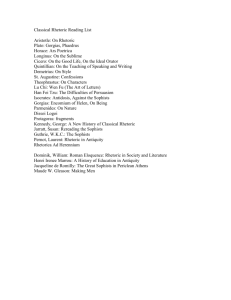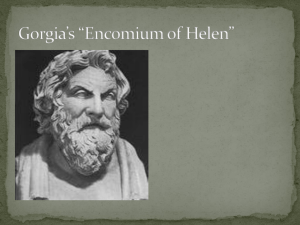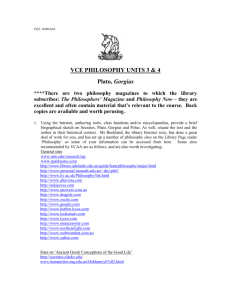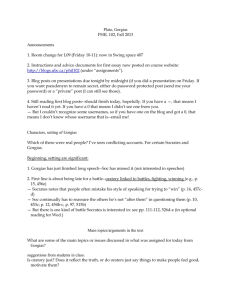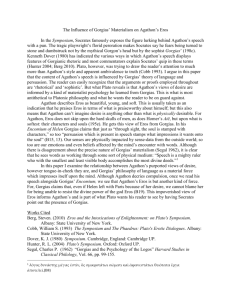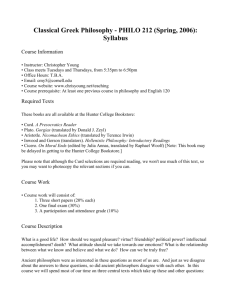Emerson (2)
advertisement
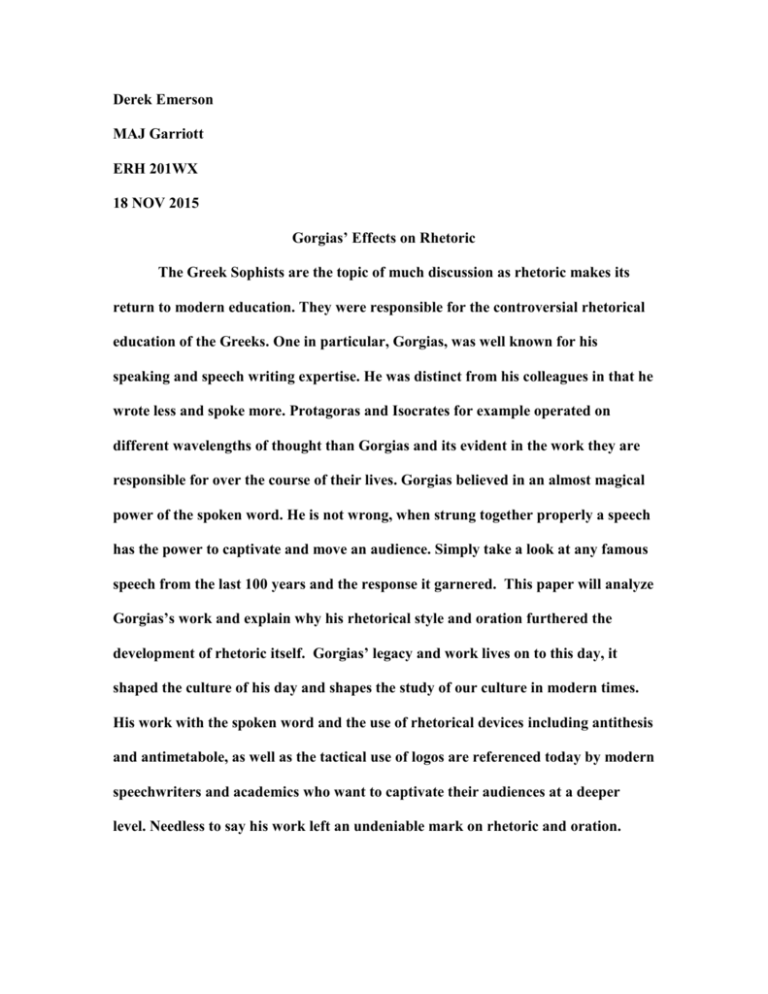
Derek Emerson MAJ Garriott ERH 201WX 18 NOV 2015 Gorgias’ Effects on Rhetoric The Greek Sophists are the topic of much discussion as rhetoric makes its return to modern education. They were responsible for the controversial rhetorical education of the Greeks. One in particular, Gorgias, was well known for his speaking and speech writing expertise. He was distinct from his colleagues in that he wrote less and spoke more. Protagoras and Isocrates for example operated on different wavelengths of thought than Gorgias and its evident in the work they are responsible for over the course of their lives. Gorgias believed in an almost magical power of the spoken word. He is not wrong, when strung together properly a speech has the power to captivate and move an audience. Simply take a look at any famous speech from the last 100 years and the response it garnered. This paper will analyze Gorgias’s work and explain why his rhetorical style and oration furthered the development of rhetoric itself. Gorgias’ legacy and work lives on to this day, it shaped the culture of his day and shapes the study of our culture in modern times. His work with the spoken word and the use of rhetorical devices including antithesis and antimetabole, as well as the tactical use of logos are referenced today by modern speechwriters and academics who want to captivate their audiences at a deeper level. Needless to say his work left an undeniable mark on rhetoric and oration. Gorgias is one ancient Greek commonly referred to when scholars talk about the foundation of rhetoric. He was of Sicilian descent and migrated to Athens early in his life. While little is known about him before he moved to Athens, in 427 B.C.E he made large impacts on what would eventually become the sophistry and the sophistic movement. His fame as an orator and rhetorician didn’t begin until he gave a series of speeches in Athens that excited crowds. These speeches won him “fame and admiration” amongst the Athenians according to the Internet Encyclopedia of Philosophy (Higgins). After gaining some notoriety in Athens, he traveled Greece as a teacher of rhetoric and as a well-known orator. He was a student of Empedocles and tutored another great Grecian mind, Isocrates (Campbell). Being a student of Empedocles is important to our understanding of Gorgias because Empedocles is one of the premier pre-Socratic philosophers. He was an esteemed poet among his many other specialties. It would not be hard to come to the conclusion that Gorgias probably gained some of his skill in the spoken word from Empedocles’s specialty with poetry. It is notable that Gorgias studied under notable poet because poetry inherently uses devices to enhance the overall experience. It is not far fetched to think that Gorgias first acquired his taste for rhetorical devices from his background in poetry, these same devices will be discussed in depth later on. As a sophist he taught the art of rhetoric and philosophy to pupils in Athens for a price. Like most Sophists, Gorgias was not a native of Athens, which kept him from participating in polis politics as a citizen; however Sophists had great influence over the young minds of the city-state itself. As well as tutoring the citizens of Athens, Sophists had a number of other roles. One of these roles included being logographers for the courts of Athens. As logographers, these sophists would use their mastery of words to create well-written orations for both sides of the court, the prosecution and the defendant. Whichever side had a better written and convincing argument would sway the jury. This was highly controversial to some early philosophers such as Plato who saw sophists as merely fools with colorful language that used their craft to fool the ignorant masses. Sophists may have been controversial but they are considered a vital portion of the culture of ancient Greece. As a sophist and rhetorician and as a man well known for his oratory skills, Gorgias had a knowledge and power with words that others simply didn’t possess. In Charles Segal’s book on Gorgias “Gorgias and The Psychology of Logos” he says this about the skill and relevance of Gorgias “Gorgias’ relevance to the present discussion, however, lies chiefly in his rhetorical works and their psychological implications”. (Segal 99) Segal does not explicitly explain what he means by “psychological implications” of Gorgias work but it’s not difficult to discern what he means. Gorgias work, whether spoken or written had a great effects on the mind and he prided himself on his ability to hold an almost magical hold over his audience. I will discuss this further in depth as the paper progresses. His development of spoken rhetoric is well known and had great effects in Greece. For example, Herrick states that Gorgias was “developing a rhetorical incantation that hypnotizes audiences, not a tight, logical proof” (39). He also uses a quote from Gorgias’s encomium: “ All poetry I ordain and proclaim to composition in meter, the listeners of which are affected by passionate trepidation and compassionate perturbation and likewise tearful lamentation….inspired incantations are provocative of charm and revocative of harm” Herrick deduces from Gorgias’s quote that a skilled rhetorician can prove any proposition (Herrick 39). This is important because it shows that Gorgias was confident in his ability to hold sway over the minds of his audience using techniques we will discuss later on. Plato would have direct conflicts with this as stated above because he believes sophists cannot know true knowledge because they are not trained in it. Plato would say that a skilled rhetorician proving a proposition is unlikely given that they are not trained in Truth., Truth capitalized being the nature of true justice Nevertheless this is what Gorgias believed. Herrick also points out that in early Greece, poetry was considered of divine origin. Gorgias used this relationship and tutorship with Empedocles and found that words have the greatest power when they evoked emotions such as fear, pity, and longing. James Porter, a notable academic from the University of California at Berkely gives a study of rhetoric in his book “Classical Antiquity” he offers support to the argument that Gorgias’ use of poetry was a powerful and useful tool that played into the power of his rhetoric. Porter uses this quote “D.A. Rusell says of Gorgias in another context, Now the emotional impact of poetry-its power to terrorise and sweep us off our feet is, as Gorgias makes clear” which is culturally accepted” (Porter 267 ) Gorgias’ use of poetry is his oration is documented and this just strengthens the argument for how effective Gorgias was. His effectiveness is arguably what has allowed his methods to transcend generations. Evidence of Gorgias influence on rhetoric over the ages is again pointed out by Herrick, he found that writers such Shakespeare used similar techniques to Gorgias to great success. President John F. Kennedy also used techniques developed by Gorgias such as antimetabole, which is the “transposing of word order in parallel clauses”, in his great speeches. One example of this is “ Ask not what your country can do for you, rather ask what you can do for your country” (Herrick 40). This is just one example of the use of Gorgias’s techniques in modern day Oration and rhetoric. Examples of techniques that Gorgias leaned on include the following: allegoria which is to say one thing and mean another, hypallage which is the use of one for another, catachresis or to use words by analogy, repetition, or resumption of an argument, pariosis or the use of balanced clauses, and finally apostrophe, or addressing some person or divinity and antithesis (Herrick 39). Of all devices though, Gorgias was the most engaged in the use anithesis. Antithesis is the placement of opposite ideas near each other. Herrick gives us the example “My opponent proposes a war that would bring us dishonor; I advocate a peace that will bring us honor” (Herrick 40) Placing two completely opposite ideas like this near one another creates something powerful that is hard to explain but evokes great emotion when heard or read. A quick Google search of modern day uses of antithesis will generate a wide array of examples. These examples of modern day use of antithesis in rhetoric range from Disney movies like “Snow White” all the way to more elaborate uses of antithesis in Shakespeare’s Hamlet where he writes “Give every man thy ear, but few thy voice”. Modern day references to techniques Gorgias used so often are the surest sign that Gorgias had a lasting effect on rhetoric. This effect is measured in the frequency and deliberateness in which we use these techniques in the Modern day. For example, listen to a speech by any notable public figure the next time you get a chance and you will notice some of these techniques used, some multiple times. In Jacqueline de Romily’s book Magic and Rhetoric in Ancient Greece, she aligns Gorgias with early practitioners of magical incantations like Empedocles and Pythagoras which would make logical sense seeing as Gorgias’s teacher was Empedocles (qtd. in Herrick 38). However Gorgias didn’t just use poetry and rhetorical devices to draft well-written speeches that evoked emotion from his listeners, he also used logos. Logos is the power of logic. Using logos Gorgias was able to connect to his audiences further. Using logic Gorgias could appeal to the mind by providing reason to his audience as to why his point was correct and in doing so he would sway his audience to his side. This only pays testament to how great an orator Gorgias was. He was a master of rhetorical devices and also used logos to reel his audiences in. This is important because it shows that Gorgias rhetorical and oratory style is multifaceted and multi dimensional. He isn’t simply relegated to one trick that he goes back to over and over again. Go back to Porters analysis of Gorgias on page 269 and you will see that Gorgias used his technique with Logos and had listeners “irresistibly overwhelmed”. Porter says “Thus Logos is an almost independent external power which forces the hearer to do its will” here (Porter 269) Porter does not mean this literally, he doesn’t mean that logos has physical control over the audience. This supports the thought that logos was one of Gorgias most powerful tools. When used effectively, Gorgias could use his methodology with logos to hold sway over his listeners; his words become powerful when logic is added. Without context this wouldn’t mean much, but now we get a clearer picture of what made Gorgias such an accomplished rhetor. Being an accomplished rhetor itself is not why Gorgias has affected todays’s rhetoric but is a byproduct of it. Gorgias’ work and the tools he helped developed are what give him lasting influence. Gorgias was like no other sophist, and rhetorician of ancient Greece. Where others used writing as their major mediums of persuasion and influence. Gorgias used his ability with the spoken word to influence his audiences. Techniques he developed are still used on a daily basis in modern times. His belief that words hold a magical power over an audience is not true in the literal sense but he was right in the sense that the spoken word does hold its listeners captive. When words are strung together with meaning and in the right way, it can move people to action and bring about certain feelings that other types of communication cant evoke. Gorgias is perhaps the sophist with the most to offer to modern day rhetoricians, which brings us full circle. His combination of rhetorical device use and logos was a potent combination for audiences who Gorgias claimed to have a magical hold over. Work Cited Herrick, James. The History and Theory of Rhetoric. 5th ed. Pearson. Print. Campbell, Gordon. "Empodocles." Internet Encyclopedia of Philosophy. Web. 1 Nov. 2015. Higgins, Francis. "Gorgias. " Internet Encyclopedia of Philosophy. Web. 1 Nov. 2015. Segal, Charles P.. “Gorgias and the Psychology of the Logos”. Harvard Studies in Classical Philology 66 (1962): 99–155. Porter, James I.. “The Seductions of Gorgias”. Classical Antiquity 12.2 (1993): 267–299. “yourdictionary.com” for google reference of modern rhetorical device use. Derek, You seem interested in Gorgias, and many scholars would agree that he deserves new attention in the 21st century. However, it’s unclear why you want to draw our attention to him. Your thesis leaves his contributions unclear to the reader, and your body paragraphs summarize Herrick and his research rather than forward your own argument. Your thoughts and where you see his influences are absent from this paper. Additionally, you don’t follow the directions for the paper. You are required to use three scholarly sources, which include books, book chapters, or journal articles. The only scholarly source you use is Herrick, and you rely too much on Herrick. Ultimately, your reader is left wondering why she shouldn’t read Herrick’s textbook rather than your paper. You are capable of more than this. It’s clear from your contributions in class that you have arguments. This is one of the platforms for them. Revise this with YOUR voice, not Herrick’s, and follow the directions on the prompt. 55 F
